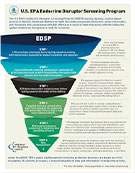News & Resources
News Release / January 03, 2019
Response to “Sicker, Fatter, Poorer: The Urgent Threat of Hormone-Disrupting Chemicals to Our Health and Future” by Dr. Leonardo Trasande
To stay below ranges of exposure determined to be safe, consumers should read product labels closely and follow directions carefully. More
In the news / June 25, 2018
Updated OECD Test Guidelines Include Endocrine Endpoints
The OECD has updated test guidelines (TGs) on the 90-day, repeated dose oral toxicity study (408) and the prenatal developmental toxicity (PNDT) study (414) to ... More
In the news / June 01, 2018
Risk Communication About EDCs
Communication about risks from EDCs should employ the internationally recognized WHO/IPCS definition, and distinguish between mere endocrine activity and true disruption. More
In the news / May 18, 2018
OPINION: Endocrine disruption – converting a definition into regulatory action
The European Commission based its EDC criteria upon the WHO-IPCS definition. These have now entered into force and will start being applied to ongoing evaluations ... More
In the news / April 09, 2018
BPA Is An Endocrine Disruptor? Science says NOT!
The scope and magnitude of the CLARITY Core Study are unprecedented for BPA. If BPA were causing any adverse health effects, they likely would ... More
In the news / March 14, 2018
Endocrine disruptor assays go fast track
EPA is ramping up efforts to create high-throughput approaches for screening chemical effects on hormone synthesis and receptor pathways. More
In the news / February 15, 2018
A Rehash Of Flawed Chemical Exposure Cost Burden Estimates
The assigned disease burden costs are highly speculative and should not be considered in any serious policy discussions serving to protect public and regulate chemicals. More
In the news / November 16, 2017
US and Australia criticise EU’s proposed EDC restrictions
The US and Australia have complained to the WTO that hazard-based EU proposals to regulate endocrine-disrupting substances (EDCs) in biocidal and plant protection products will ... More
In the news / October 19, 2017
About The 2017 NAS Report On Endocrine Disrupting Chemicals And Low-Dose Effects
Low dose effects and NMDRs are often confused as they are frequently discussed together, e.g. in reference to the non-monotonic, low-dose hypothesis – the idea ... More
In the news / September 01, 2017
Lists of “Endocrine Disrupting” Chemicals Mislead Public
The French “official list” of EDCs officially undermines the scientific credibility of the French government’s approach to the endocrine issue. The public deserves better. More
In the news / July 08, 2017
Letter: Further thoughts on limitations, uncertainties and competing interpretations regarding chemical exposures and diabetes
Although disappointed, we are not surprised that Trasande’s response tries to avoid a serious discussion of legitimate scientific issues by accusing those who disagree with ... More
In the news / July 01, 2017
Estimates of human cost burden from exposure to endocrine-disrupting chemicals grossly exaggerated
The Endocrine Society published a series of economic papers in 2015 and 2016 that estimated annual health care costs attributable to EDC exposure in the ... More
In the news / June 22, 2017
Human cost of endocrine-disrupting chemicals exaggerated
Scientific impartiality must be mirrored in papers discussing endocrine disruptors say Gregory G. Bond and Daniel R. Dietrich. More
In the news / June 16, 2017
The current debate on cost burden by human exposure to endocrine disrupting chemicals
Recently, Gregory G. Bond from Northport, USA, and Daniel R. Dietrich from the University of Konstanz have contributed a comprehensive review about human cost burden ... More
News Release / May 31, 2017
Trasande-led human health impact and cost estimates attributed to endocrine disrupting chemical exposure completely unfounded, researchers show
Peer-reviewed paper published in Archives of Toxicology reports substantial shortcomings with underlying methodology, casual disregard of scientific principles More
In the news / April 28, 2017
Sensible And Pragmatic Proposal For Implementing The EC’s Criteria For Identifying Endocrine Disrupting Chemicals
The ECETOC proposal should be received favorably as it represents a sensible and pragmatic approach to what otherwise could be an overly complicated process. More
In the news / April 28, 2017
Publications result from SETAC workshop on endocrine active substances
To try to reach a consensus on appropriate approaches for establishing environmental safety for endocrine active substances, the Society of Environmental Toxicology and Chemistry (SETAC) ... More
In the news / April 19, 2017
Is America’s Sperm Crippled by Chemicals?
Following the lead of a New York Times article, numerous headlines have emerged blaming endocrine disrupting chemicals (EDCs) as the source of an emerging male ... More
In the news / March 31, 2017
Current test methods detect endocrine-disrupting chemical potential
Collectively, existing test methods are fully capable of detecting and characterizing potential adverse effects – whether directly due to interacting with the endocrine system, effects ... More
In the news / March 12, 2017
The Trouble Lies Not In Our Sperm, Poor Nick
The New York Times’ Nicholas Kristof plays up a non-existent threat to sperm from trace exposures in the environment. More
In the news / March 06, 2017
Letter to the Editor: Limitations, uncertainties and competing interpretations regarding chemical exposures and diabetes
The Trasande et al paper fails to meet standards for good practices in scientific reporting: stating the limitations of the underlying data, clearly articulating uncertainties, ... More
In the news / February 14, 2017
A Critical Review Of Flawed Claims Made In AIM Declaration On EDCs
AIM makes a number of claims of health effects attributable to EDCs that are highly speculative – i.e., the evidence is hardly as convincing as ... More
In the news / December 15, 2016
Nature editorial ‘exploits public anxiety’ on endocrine disruptors
In the news / December 13, 2016
Endocrine science: Will the real “manufacturers of doubt” please stand up?
By blaming others for “manipulating the science,” the authors of the Le Monde op-ed may actually be pointing the finger at themselves. More
In the news / December 13, 2016
But, Who’s Really Manipulating The Science On Endocrine Disrupting Chemicals?
The EDCs debate is highly controversial and polarized with serious questions raised on both sides about exactly who is, in fact, manipulating the science. More
In the news / December 01, 2016
Science “Undisrupted” with U.S. Regulation of Endocrine Disrupting Chemicals
We hope that the EU will look at the U.S. system as a model with its own chemical regulation. Moving from a hazard-based approach to ... More
In the news / November 23, 2016
When Salt Is An Endocrine Disruptor, The Term Is Officially Meaningless
The Canadian Journal of Fisheries and Aquatic Sciences published a new study entitled, "Interactive effects of road salt and leaf litter on wood frog sex ... More
In the news / October 24, 2016
Exposure to EDCs in the U.S. and EU: What They’re Saying about the Alleged Health Care and Lost Earnings Cost Estimates
A series of recent economic analyses by Trasande et al. attempts to sound an alarm in both the U.S. and European Union over staggering health ... More
In the news / October 20, 2016
Do Endocrine Disruptors Really Cost Us Hundreds Of Billions?
It’s a scary prospect—everyday items are costing our country billions. Unfortunately, like many other headline-generating studies, this paper is based on flawed science. More
In the news / October 20, 2016
‘Hormone-Disrupting Chemicals’ Are Not A Global Health Scourge
Leonardo Trasende is an activist scientist, trotting out junk science at rapid speed to further his political, policy, and regulatory goals. That includes his latest, ... More
In the news / October 18, 2016
Headline Hype or Sound Science? New Study Claims U.S. Loses $340B a Year to Chemical-Related Health Problems
A recent study has been grabbing headlines with the claim that health issues related to chemical exposure could be costing the U.S. around $340 billion ... More
In the news / October 18, 2016
Time Magazine Promotes Superstitious Chemophobia
Time magazine is reporting a correlational study that claims to have sufficiently tortured the data, ah, quantified the economic harm that these estrogen-fueled epidemics is ... More
News Release / October 17, 2016
ACC Comments on Lancet Paper Alleging Significant U.S. Health Care Costs from Exposure to EDCs
Today’s release is the latest in a series of papers in which Dr. Trasande and his colleagues demonstrate a casual indifference toward scientific principles, yet ... More
In the news / October 10, 2016
ShiFt happens, but it’s not always good science
Rather than making discoveries that established science cannot explain, advocates are simply making new allegations, using unique interpretations that have already been rejected by established ... More
In the news / September 29, 2016
Pharma industry says EDC criteria need a risk-based approach
Sini Eskola, Director of Regulatory Affairs at the EFPIA, told Manufacturing Chemist that the industry welcomed the guidance and appreciated that the content was based ... More
In the news / September 22, 2016
Scientists Call for ‘Potency Comparisons’ in EDC Criteria
The European Commission's criteria for identifying endocrine disrupting chemicals (EDCs) should allow for potency comparisons with natural hormones and human pharmaceuticals, according to more than ... More
In the news / September 16, 2016
NIEHS 25 Year Celebration Of Endocrine Research — Some Progress, But An Even Greater Opportunity To Deliver Clarity
It would be helpful if NIEHS would publicly endorse EPA's EDSP program and the WHO/IPCS definition of an EDC and emphasize the importance of having ... More
In the news / September 15, 2016
ACC: NIEHS celebrates 25 years of endocrine disruptor research – we ask, what’s to celebrate?
Today, misinformation and public confusion over EDCs runs rampant, and a slew of products ranging from sunscreen to plastic food containers are potentially at risk ... More
In the news / September 14, 2016
An appeal for the integrity of science and public policy
We, scientists and signatories of this appeal assert our concern for the erosion of scientific principles in the purported validation of experimental evidence, which is ... More
In the news / September 14, 2016
Endocrine disruptors: science is more potent than politics
A large group of scientists from across various sectors are supporting an appeal to the European Commission regarding its proposed regulation to establish criteria for ... More



